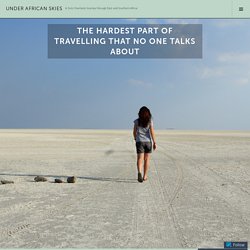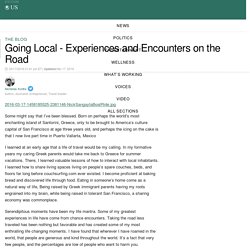

The Hardest Part of Travelling that No One Talks About – Under African Skies. This piece was not written by myself but I couldn’t have said it better.

The words epitomise a strong undercurrent I have been feeling for a while. I couldn’t quite put my finger on it, that yearning I still feel five months after completing my trip. If you’ve ever traveled extensively or taken a journey into the unknown, welcome to the group of lost individuals who will never be truly understood. Read below… You can stay up to date with my adventures right here – Twitter or Instagram @sharkydillon or see my videos of Africa on YouTube. Tourism in the Developing World - Beneficial or Exploitative? Every few months, it seems, there is a flurry of passionate and well-intentioned opinions that question the viability of tourism centered on poor villages, arguing that the benefits to be gained are outweighed by the potential for exploitation of poor people.

Some of the rhetoric in this ongoing debate has shed more heat than light on the issue, but let’s focus on some real, on-the-ground facts and positive impacts. In Rwanda, tourism is currently the largest foreign-exchange earner. The majority of revenue comes from wealthy safari tourists in Kenya and Tanzania who jet in for 2-3 days to see Rwanda’s legendary mountain gorillas.
However, Rwandans recognize that more tourism is needed and that each additional day a tourist spends in country translates into jobs and growth. Slum Tourism. Is it ever right for tour operators to offer excursions to slums?

Like us, you are probably uncomfortable with the idea of wealthy tourists paying money to look at poor people. 6 key travel trends for 2016. The Growing Trend Towards Working Holidays. Working Holidays are exploding in growth and popularity where some experts are seeing a one-third increase internationally mostly driven by the Generation Y crowd.

Aviation Q&A: the impact of flying on the environment. Does air travel really have a big environmental footprint?

There's no way around the fact that flights are bad news for the environment. It's not just that planes are worse than most other forms of transport in terms of the impact of greenhouse gases per passenger mile. Just as important is the simple fact that flying allows us to travel a far greater number of miles than we otherwise could. Thanks to these two factors, individual trips by air can have a remarkably large carbon footprint – which helps explain why aviation has become such a heated issue in the climate change debate. What is the total impact of flying on the climate? As the aviation industry is usually keen to point out, planes account for only around 1.5%–2% of global CO2 emissions. First, the total global warming impact of each flight is thought to be around twice as high as the CO2 emissions alone (see 'What's an aviation multiplier?
' Is the UK government's aviation policy compatible with its carbon targets? Business Destinations – Make travel your business. Destinations such as Cuba, Colombia, Burma, Mexico, Brazil and Jordan have become more popular with tourists as adventure travel rises Climbing Mount Kilimanjaro, base-jumping off a cliff or trekking through the Sahara might not be at the top of everyone’s to-do list.

But adventure travel – once limited primarily to gap year-takers travelling to Outer Mongolia in order to find themselves – is fast becoming mainstream. This means that sun, sea and sand – the three ingredients that once promised families everything they’d ever asked for – are gradually being outpaced by hikes, wildlife treks, biking expeditions and cultural tours; the key trends seen in 2014, according to the Global Report on Adventure Tourism, published by the Adventure Travel Trade Association (ATTA).
What Do Millennials Really Seek When They Travel? Millennials, those intrepid, energetic, internet-savvy travelers prefer partying over cultural pursuits when traveling — right?

They’re on social media whenever possible, and grab KFC whenever they can, wherever they may be, yes? Well, maybe not. Topdeck Travel, popular provider of group travel for 18-30 somethings, surveyed 31,000 people from 134 different countries: 88 percent of them traveled overseas between one and three times a year; 94 percent were between 18-30; 30 percent traveled solo; and the majority traveled in Europe, North America and Australia/New Zealand. A sampling of the surprising survey results are below, along with my comments: Going Local - Experiences and Encounters on the Road. Some might say that I’ve been blessed.

Born on perhaps the world’s most enchanting island of Santorini, Greece, only to be brought to America’s culture capital of San Francisco at age three years old, and perhaps the icing on the cake is that I now live part time in Puerto Vallarta, Mexico I learned at an early age that a life of travel would be my calling. In my formative years my caring Greek parents would take me back to Greece for summer vacations. There, I learned valuable lessons of how to interact with local inhabitants. I learned how to share living spaces living on people’s spare couches, beds, and floors far long before couchsurfing.com ever existed.
Have an environmentally friendly vacation. - Respect the local environment.

Stay on trails and public footpaths; do not remove plants or feed animals; and never litter. - Choose reputable, conservation-minded tour operators and suppliers. - Conserve water.